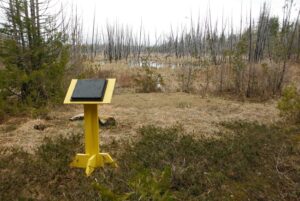Wiikwemkoong Unceded Territory working to protect at-risk species and wildlife

By Rick Garrick
WIIKWEMKOONG UNCEDED TERRITORY — Wiikwemkoong is establishing a marsh outdoor educational site at Meshkoodayaang Shkoo sii Prairie Point Marsh and collaborating on a wolf study through its continuing work on species at risk through federal and provincial government funding.
“Because that area we have identified has particular species at risk around or within the site itself, we want to promote educational learning opportunities for the community [citizens] and the general public on what species at risk inhabit a marshland, both for reptiles, plants and birds,” says John Manitowabi, manager of Lands and Natural Resources in Wiikwemkoong. “What can you find, what’s the purpose, what’s the ecosystem of a marshland entail.”
Manitowabi says they started collaborating with Guelph University and Trent University this year on the wolf study at Point Grondine and the surrounding territory.
“The goal of that was to see if we were able to determine if any Algonquin wolves, which are a species at risk, are within Point Grondine or surrounding territory, and if they are, then where are they travelling to?” Manitowabi says. “They were able to successfully collar five wolves, and from there, the DNA results will determine what species of wolf they are.”
Manitowabi says the initial results indicate that the wolves travel about 30 to 40 kilometres.
“So it’s a huge range that they’re travelling,” Manitowabi says. “Over the winter months and summer months, we’ll really get an understanding as to what their territory is. Eventually those collars will fall off in the summertime and then we’ll have to go and retrieve those collars and determine if we will be able to do it again. [The study] will help in future planning for any activities, that we don’t impact their areas.”
Wiikwemkoong received about $95,100 from the Ministry of Environment, Conservation and Parks Species at Risk Stewardship Program’s $4.5 million investment to protect species at risk that was announced on March 11. The $95,100 in provincial funding will be provided over a two-year period from 2021-2023.
“The on-the-ground work carried out by stewardship organizations is extremely important to protecting at-risk plants and wildlife in Ontario,” says David Piccini, Minister of Environment, Conservation and Parks. “Our government is proud to support its partners and the many important research and recovery projects they are undertaking this year to help preserve our province’s rich biodiversity for generations to come.”
The provincial funding for Wiikwemkoong is aimed at habitat management and threat reduction for 21 species at risk in Wiikwemkoong’s alvars, oak savannas and coastal wetlands, including brushing woody species, small low-level burns, signage and barriers, improving turtle nest habitat and control of invasive species.
“This coming spring we have prescribed burns planned for various areas around the community of Wiikwemkoong, and that is to assist with ensuring the natural vegetation, the plant species are maintaining those areas,” Manitowabi says. “If they are not, then this is where the other non-native species come in and take over.”
Manitowabi says they have identified some Blanding’s Turtle and snapping turtle nesting locations around the community.
“We’ve done some improvements to those areas to ensure those nesting turtles, when they do nest there, that the nests are not disturbed by human actions or through predators, raccoons or foxes,” Manitowabi says. “The site is caged and it’s protected over the spring and summer months until the turtles hatch.”
Manitowabi says they received $200,000 in funding over two years from the federal government for species at risk work, creating best management practices, promoting educational opportunities for citizens and the general public and collaborating with other partners such as the Manitoulin Streams Improvement Association and Nature Conservancy of Canada.

